Algeria
In a square near the center of Algiers, currency traders carry wads of euros, pounds, and dollars, hoping to exchange them to those worried about the plummeting value of the Algerian dinar.
This black market for foreign currencies is among the signs of the economic woes plaguing Algeria. The state, reluctant to allow the exchange rate to adjust fully, has proven incapable of limiting demand among the population as confidence in the dinar remains low.
The widening parallel exchange rate underscores how every day Algerians have lost buying power as the government has juggled competing priorities, trying to combat inflation and maintain state spending, subsidies, and price controls that keep people afloat.
In the oil-rich North African nation, business owners are rumored to be dumping their assets and scrounging up euros on the black market so their wealth isn't stuck. Middle-class people also rely on euros and dollars to buy things in short supply like medicine, vehicle parts, or certain foods.
Last week, the official exchange rate allowed one euro to be sold for 145 Algerian dinar, while on the same day, currency traders were selling one euro for nearly 241 dinars on the black market — 66% higher than the official exchange rate.
Rabah Belamane, a 72-year-old retired teacher from Algiers, told The Associated Press that the official rate is fiction and that his pension doesn't go as far as it used to in either dinar or euro.
"The real value of the dinar is on the informal market, not in the bank, which uses an artificial rate to lie to the public," Belamane said.
Algeria has long been known for having among the region's most closed economies. It limits the amount of foreign currency its citizens can access to a modest tourism allowance that amounts to less than needed to carry out one of Islam's pilgrimages to Mecca or visit family in Europe's large Algerian diaspora.
The government estimates roughly $7 billion worth of foreign currency trades hands on the country's black market.
From Lebanon to Nigeria, experts warn that having two parallel exchange rates can distort a country's economy, discourage investment and encourage corruption. Algeria has historically been reluctant to lower the official value of the dinar, worried that devaluation will spike prices and anger the population.
Traders are intimately aware that the gap between the official and black market exchange rate can narrow or widen by the day. They expect it to swing up as Ramadan approaches.
"In recent days, the supply of euros has been lacking, which explains how it has shot up," trader Nourdine Sadaoui told the AP as he took a pause from yelling "Change!" at people passing by.
That shortage may make purchasing certain goods difficult for Algerians. But some in government believe it reflects the success of import restrictions and laws limiting how many euros can be brought into the country.
Hicham Safar, the head of a finance committee in the lower house of Algeria's Parliament, said last week that he "welcomed" such concerns. The growing chasm between the official and black market rates meant fewer euros are getting into the country, he said.
"There's no more overcharging on imports," he said on television station Echourouk, citing efforts by customs officials to better regulate imports through the Bank of Algeria and minimize the use of foreign currency.
For decades, steady revenue from oil and gas allowed Algeria to import everything from toothpicks to industrial machinery. The country's large import market concentrated economic power in the hands of a small group of businessmen known to overbill clients and stash profits abroad, including in European and Emirati banks.
Since President Abdelmajid Tebboune took power, the country has targeted the so-called "oligarchs," including businesses active in imports. Throughout his tenure, the costs of basic goods in Algerian dinars have swung and imports have been further limited.
Algeria emerged as an unexpected beneficiary of the war in Ukraine, as energy prices rose and Europe sought non-Russian suppliers of oil and gas. But the country has experienced food crises and rising anger as the prices of necessities like chicken, cooking oil and legumes have risen.
Economist Karim Allam said the strength of the euro had worked to Algeria's detriment, cutting into the purchasing power of those who make money in dinars. He is skeptical of the idea that a shortage of foreign currencies reflects the government's success, but also doubts that business people are fleeing the country in droves or sending money abroad.
"I don't think they'll take the risk of smuggling currency out of the country, which is considered an economic crime punishable by 20 years' imprisonment," he said.
Regardless, the falling value of the dinar on the black market is one indicator of how Algerians continue to lose purchasing power despite governmental efforts to stabilize the economy while keeping government spending and subsidies high.
"Inflation has destroyed the buying power of Algerians, who are falling into poverty. The dinar has become worthless," said Belamane, the retired teacher.




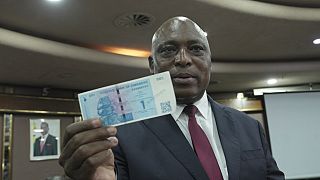
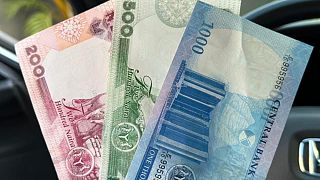
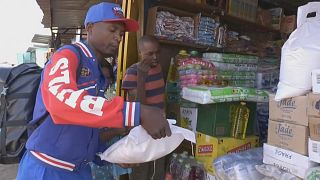
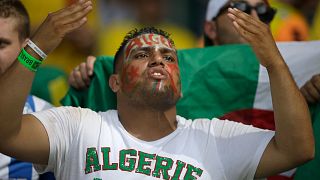



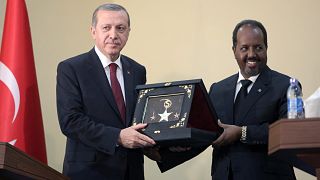
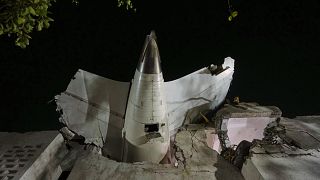
Go to video
Ruto's $9M mega church sparks outrage amid Kenya's crisis
Go to video
“I can’t do nuttin’ for ya man”, Nigerian Minister quotes Flavour Flav in rejection of Trump policy
11:17
Bridging the legal gap in Africa’s digital boom {Business Africa}
01:54
"Great economic potential in Africa": five African leaders have lunch with Trump
Go to video
U.S. slashes visa duration for some African nationals amid policy shift
Go to video
Nigeria snubbed at White House summit, opposition blames Tinubu